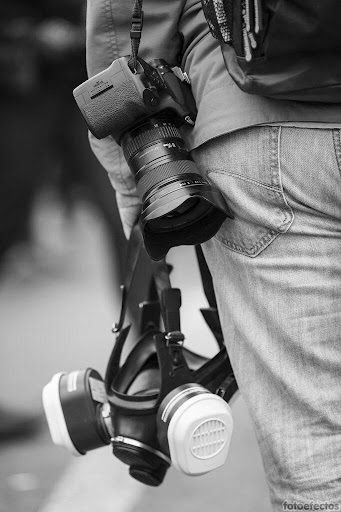Think
The Duties and Rights of a War Journalist
Adrián Samayoa, student of the double Degree in History and Journalism, highlights the responsibility of war correspondents and their journalistic work in conflicts.

Since the beginning of Russia's invasion of Ukraine, and even more so with the arrival of its troops in its capital, Kiev, the media on speech have been closely monitoring events with war correspondents, who transmit first-hand the what, how and why of what is happening. This effort by journalists, who put their lives at risk by being on the front line, has a much greater meaning than entertainment. Are we aware of the value and responsibility they exercise in transmitting them?
The action of the media speech as a fourth power is accentuated in conflicts where the population is overwhelmed by propaganda that only seeks to keep spirits high, manipulating, hiding or inverting data. This work is carried out "not only to have an informed and free society, but also to give a voice to the actors in conflicts and, especially, to the civilian population , which in most cases is silenced under the noise of war "1. This information, within a globalised world in which state actions have worldwide repercussions, allows the population to approach what is happening: with its context, consequences and forms their own judgement.
With this information, abuses of power, human rights abuses and war crimes can be prevented, and social inequalities and injustices can be exposed and condemned. Without them, a population would be ignorant of unjust, inhumane or tragic events where, through institutions or their government, they could help the less fortunate. This social work of journalists is very much accompanied by a responsibility. As has been studied, the media of speech can influence society, with terms or headlines, even forcing their government to participate in a war2.
Within this responsibility, the journalist must have two visions that allow him or her to convey information accurately and in its entirety. First, he or she must be a "front-line infantryman" who transports us to the conflict and the vision of the "General Staff "3 who knows the general political, economic, strategic and cultural context. Second, his or her job is not limited to gathering and transmitting information, but to ordering and contrasting it, especially in this age of information overabundance where images or information without context, transmitted with great ease by a social network , can cause misinformation.

The question could be asked: Is it the war journalist's mission statement job to report on catastrophes and injustices, or is it to help them change? At final, their job is not just to entertain an audience, but to seek civil mobilisation to end these injustices. Its importance and responsibility can be summed up in the words of Christiane Amanpour, CNN war correspondent: "When good people do nothing, the bad people triumph. (...) We journalists, with our papers and pens, with laptops and satellite connections, cameras and TV crews, can make a difference, we can help make the world a better place".
Finally, recalling the submission of award Luka Brajnovic to degree scroll posthumously to journalist David Beriáin on 17 February, his wife remarked that war journalists are: "The vehicle between what is happening and those of us who are getting the story". She also pointed out, as Kapuscinski makes clear in his book Cynics are no good for this official document4, that journalists must above all be good people: "If you are a good person you can try to understand others, their intentions, their faith, their interests, their difficulties, their tragedies. And immediately become, from the very first moment, part of their destiny".
The work of war journalists is essential to understand the status of people who, suffering injustice, are forgotten by perspectives born of indifference: those who think that their status does not affect me and those who excuse themselves by saying that they can do nothing to help them. Correspondents who give their lives so that we can learn about these conflicts enable us to make better decisions, facilitate more accurate judgements and especially etch them in the annals of history.
___________________________________________________________________________________
1 González, T. S. (02 October 2019). war correspondents: review and update of work journalism in conflicts. Retrieved from Revista de Pensamiento Estratégico y Seguridad CISDE, 4(2).
2 Cheeley, B. (10 June 2019). Misinformed but Well Meaning: "Ethnic Cleansing" and United States Newspaper Coverage of the Bosnian War From 1992-1995. Salem, Oregon, United States of America.
3 Ramonet, I. (1997). La guerra en los medios. Madrid: publishing house discussion .
4 Kapuscinski, R. (2002). Los cínicos no sirven para este official document. Barcelona: Anagrama.
If you liked the article, you might be interested in one of our Degrees!









